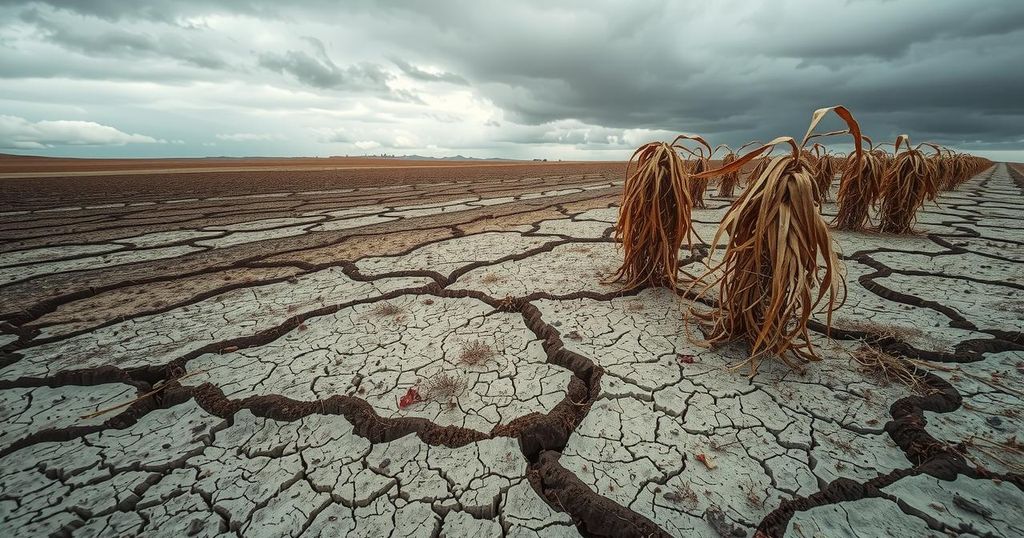Extreme weather is increasingly damaging crops worldwide, with significant events documented by Carbon Brief, including floods, droughts, and changing climatic conditions affecting agricultural productivity. The IPCC report highlights the growing frequency of food production losses linked to climate extremes, necessitating urgent adaptations in farming practices and investment to prepare for worsening weather impacts. The intersection of climate change, socio-economic challenges, and agricultural resilience requires a comprehensive response.
Extreme weather conditions are increasingly devastating crops globally, with events such as floods in Tanzania destroying corn fields, droughts in Vietnam affecting coffee production, and adverse conditions harming Cambodia’s renowned Kampot pepper. Carbon Brief has compiled a map documenting 100 instances of crop damage from climate-induced extremes, spanning from January 2023 to December 2024, primarily sourced from English media reports, which may overlook certain regions in the global south.
The sixth assessment report from the Intergovernmental Panel on Climate Change (IPCC) indicates that rapid losses in food production linked to extreme weather have become more prevalent. The report expresses a high-level certainty that these events will push existing agricultural zones beyond viable climatic conditions, raising concerns among experts regarding the sustainability of global agriculture amid escalating climate extremes.
The ramifications of extreme weather on agriculture are both immediate and prolonged, severely impacting crop yields. For instance, a significant typhoon in 2012 devastated banana crops in the Philippines, with full recovery taking around five years, as noted by Dr. Monica Ortiz, an environmental scientist. Similar shifts are observed in Nepal, where rising altitudes are now required to cultivate apples and declining citrus crops suffer from increased pests and diseases.
Prof. Andy Challinor emphasizes the complexity of climate-induced risks to agriculture, highlighting their interactions with trade and geopolitical factors. He asserts that the systemic resilience of food systems is crucial in mitigating these challenges, and ongoing weather extremes complicate predictions and strategies for adaptation. Carbon Brief’s analysis indicates a variety of crops are being affected by climatic extremes, a situation exacerbated by human-induced climate change leading to more frequent and severe weather events.
Several key extreme weather occurrences have been linked to climatic change through detailed studies, such as heavy rainfall in Brazil causing significant soybean crop damage. The El Niño phenomenon has further intensified drought conditions in southern Africa, undermining Zimbabwe’s maize production, while countries across Latin America have faced a combination of drought and wildfires, adversely affecting local agriculture.
Although the focus of this analysis is primarily on crops, it is important to note that animal agriculture has also suffered due to extreme weather, as experienced in Mongolia where a harsh dzud winter caused the death of over seven million livestock. These severe climate events threaten rural employment and increase migration, highlighting the broader socio-economic impacts of climate change on agriculture.
Climate extremes are also altering labor conditions within agriculture, as farmers are increasingly forced to adapt their work schedules to avoid peak heat. On the positive side, certain crop species may benefi from warmer climates; crops like durian and mango in Malaysia may thrive. Nevertheless, the overall outlook of future food production remains concerning, with rising temperatures likely to jeopardize the viability of existing agricultural practices.
The IPCC report warns that a 2°C increase in global temperatures could result in significant adverse effects on food production. Many regions will face climatically unsuitable conditions for crops and livestock, prompting a need for transformative adaptation strategies. While farmers may implement adaptive practices, Prof. Elena Piedra-Bonilla stresses that small-scale farmers, particularly in countries with minimal contributions to emissions, face daunting difficulties in implementing such changes amid escalating hazards.
Multiple adaptation strategies, including sustainable resource management and crop diversification, are recognized as essential to reducing climate impacts. However, economic barriers hinder effective implementation, as emphasized by the low percentage of climate finance directed toward agricultural systems. Emergency aids like crop insurance are becoming increasingly unaffordable, further complicating resilience efforts amid climate change.
Extreme weather has become a significant threat to global agriculture, causing unprecedented crop damage and long-term implications for food production systems. Multi-faceted challenges arise from climate change, necessitating urgent adaptations and investments to ensure resilience in agriculture. As agricultural viability is threatened, especially for small-scale farmers, comprehensive support and systemic transformation are crucial to preparing for intensifying climate impacts. Striking a balance between immediate responses and long-term resilience will be imperative.
Original Source: interactive.carbonbrief.org






